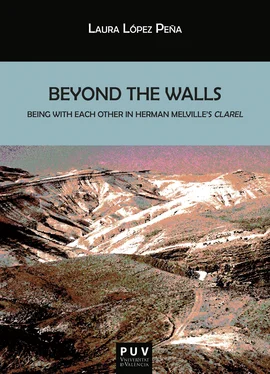Laura López Peña - Beyond the Walls.
Здесь есть возможность читать онлайн «Laura López Peña - Beyond the Walls.» — ознакомительный отрывок электронной книги совершенно бесплатно, а после прочтения отрывка купить полную версию. В некоторых случаях можно слушать аудио, скачать через торрент в формате fb2 и присутствует краткое содержание. Жанр: unrecognised, на английском языке. Описание произведения, (предисловие) а так же отзывы посетителей доступны на портале библиотеки ЛибКат.
- Название:Beyond the Walls.
- Автор:
- Жанр:
- Год:неизвестен
- ISBN:нет данных
- Рейтинг книги:3 / 5. Голосов: 1
-
Избранное:Добавить в избранное
- Отзывы:
-
Ваша оценка:
- 60
- 1
- 2
- 3
- 4
- 5
Beyond the Walls.: краткое содержание, описание и аннотация
Предлагаем к чтению аннотацию, описание, краткое содержание или предисловие (зависит от того, что написал сам автор книги «Beyond the Walls.»). Если вы не нашли необходимую информацию о книге — напишите в комментариях, мы постараемся отыскать её.
Beyond the Walls. — читать онлайн ознакомительный отрывок
Ниже представлен текст книги, разбитый по страницам. Система сохранения места последней прочитанной страницы, позволяет с удобством читать онлайн бесплатно книгу «Beyond the Walls.», без необходимости каждый раз заново искать на чём Вы остановились. Поставьте закладку, и сможете в любой момент перейти на страницу, на которой закончили чтение.
Интервал:
Закладка:

Dome of the Rock , Jerusalem, 2009 Dennis Berthold
1 See Hobsbawm 1990.
2 This is the result of my own counting of the lines of the poem: 4,783 lines for Part 1, “Jerusalem”; 4,627 for Part 2, “The Wilderness”; 4,267 for Part 3, “Mar Saba”; and 4,186 for Part 4, “Bethlehem”.
3 Unless otherwise specified, italics in all citations correspond to the original.
4 Melville uses the terms “one-sided” or “one-sidedness” recurrently, for example, in The Confidence-Man (1857). He generally makes use of the dash in the word “one-sidedness” but not in the term “manysidedness”. The present volume follows Melville’s criterion, interpreting his use or non-use of the dash as a willingness to reinforce the adherence to monologic meaning, and, therefore, imposition of thinking barriers, denoted by the term “one-sidedness” and its derivates, on the one hand, and the dialogism, connective nature and transcendence of thinking barriers emphasized by “manysidedness”. A similar criterion has been adopted when using the terms “inter(-)personal”, “inter(-)human”, and “inter(-)subjective”, which are written both with and without a dash at different moments of this study. This is aimed to emphasize the walls between individuals (with a dash), on the one hand, or the transcendence of such walls and relational conception of being (without a dash), on the other.
5 The reference to diving finds its origins in a letter to Evert A. Duyckinck, dated March 3, 1849, in which Melville wrote: “I love all men who dive ” ( Correspondence 121).
Chapter 1
Intersubjective Universalism:
A Theoretical Articulation
AGAINST THE WALLS
How to generate a form of togetherness that does not entail the sacrifice of the individual within the collective is one of the most central, difficult, challenging, and recurrent concerns in the history of humanity. Thinkers of all times have examined the advantages and limitations of different local and global allegiances by which human beings are inserted into communities or assembling categories such as patriotism and the nation-state, ethnicity, religious belief, social class, culture, political ideologies, gender, or sexual identities. From the second half of the twentieth century, a number of philosophers, sociologists, academics, and artists have excelled in their investigations of the difficulties and risks, yet necessity, of transcending these traditional forms of communitarian belonging in order to imagine more fluid ways of conceiving interpersonal relationships beyond the binary Us/Them that communitarianism inevitably generates. These theoretical contributions are enabling to articulate from a theoretical perspective the political project in Melville’s Clarel: A Poem and Pilgrimage in the Holy Land , which this study interprets in the light of intersubjectivity and universalism.
This volume’s articulation of universalism, however, starts by acknowledging the urgency of moving away from the traditional construction of universalism, particularly since the Enlightenment, based on a monolithic “Universal” imposing European culture with colonialist, homogenizing, even violent ends. As a consequence of this imperialist universalization of a particular made dominant, it is not at all surprising that universalism has had so many detractors. As a sociopolitical project, universalism continues to be negatively associated with neutralization of difference and homogenization; it is considered a project aiming to absorb the plurality of humanity within a monolithic One. In fact, detractors of universalism accuse this project of being anchored in an old-fashioned, restrictive—racist, patriarchal, heteronormative, Christian—notion of the human subject that is evidently hierarchical, dangerously neutralizing, and ultimately totalitarian, exclusive, and even inhuman, in that it does not represent the characteristic plurality constituting humanity. Due to this negative reputation, indigenous and non-Western intellectuals (from Africa, Asia, South America, as well as from the religious point of view of Islam), on the one hand, and, identity-based groups within the West, on the other hand, have long disregarded universalism as a valid political movement for the construction of democratic societies, since each of these groups have for a long time been actual victims of the deeply marginalizing traditional Universal. Due to the negative reputation it has been made to earn, it is no wonder, then, that universalism is conceived as a dangerously totalitarian and homogenizing enterprise still in the twenty-first century.
Herman Melville’s oeuvre is expressive of a recurrent and profound critique against this negative universalism. Already in the nineteenth century, Melville rejected the premises upon which traditional universalism, in its vindication of the universalization of certain particulars over others, was being constructed and often imposed. Unlike other writers of his time such as Ralph Waldo Emerson and Walt Whitman (the latter Melville’s full contemporary), Melville was skeptical of universalizing certain temporary feelings or mindsets. Attracted as he was by Emerson’s pantheistic defense of the individual merging within “the currents of the Universal Being” through nature (Emerson “Nature” 10), Melville would confess that “there is some truth” in this “ all feeling”, at the same time that he would warn that “what plays the mischief with the truth is that men will insist upon the universal application of a temporary feeling or opinion” ( Correspondence 194). Melville’s conception of universalism, as expressed in his writings, is based on a belief in the humanity of all human beings, as well as in the necessary specificity and individualization of the human in order not to fall into abstract, and therefore paradoxically dehumanizing, categorizations. Deeply sensitive and respectful of the extraordinary plurality of humanity, and of the fact that plurality itself is the very trait defining humanity, Melville was critical of discourses, projects, and powerstructures neutralizing human plurality and individuals’ singularity within a collective Unum in their attempt to empower a specific particular. Instead, Melville’s construction of universalism is closer to what Linda Zerilli has defined as a “site of multiple significations” (8), since it underscores the dialogic and permanently imperfect nature of any form of knowledge, and, consequently, the fallacy of monologic Truths. In the 1876 Clarel , Melville emphasized the inevitable partiality of any interpretation of reality, as well as the narrowness, authoritarianism, and (self-)destructive dangers of clinging to monolithic conceptions and, frequently, impositions, of “Meaning”. Melville exposed and denounced monologic thinking in his texts. He both defended and created literary contexts encouraging plural thinking whereby different, and often radically opposed, conceptions of the world are juxtaposed, laid open, tested, critically assessed, and, many times, as with those worldviews that violate the plurality of humanity by upholding supremacist assumptions, eventually rejected. Melville’s universalist conception of humanity never falls into idealism. Depicting Jerusalem, in particular, and Palestine, in general, as contexts of division and inter-human hatreds which may be read as resonant of the inter-human divisions of postbellum U.S., in Clarel , instead of celebrating the multicultural character of the so-called Holy Land, the author analyzes the fact that innate depravity most often than not cancels out innate humanity. Realizing the necessity of universalism, thus, Melville at the same time acknowledged its unfeasibility, a pessimism which undoubtedly suffuses both the yearning and the lament for universalism he articulates. Yet, on the other hand, the fact that he is not complicit in the bleak pessimism, even nihilism, which he makes some of his characters representative of, together with his insistent analysis and articulation of universalism throughout his entire—very prolific—literary production may be indicative of the significance Melville placed on the project despite being aware that the very human nature that might give it force made it, at the same time, largely impracticable.
Читать дальшеИнтервал:
Закладка:
Похожие книги на «Beyond the Walls.»
Представляем Вашему вниманию похожие книги на «Beyond the Walls.» списком для выбора. Мы отобрали схожую по названию и смыслу литературу в надежде предоставить читателям больше вариантов отыскать новые, интересные, ещё непрочитанные произведения.
Обсуждение, отзывы о книге «Beyond the Walls.» и просто собственные мнения читателей. Оставьте ваши комментарии, напишите, что Вы думаете о произведении, его смысле или главных героях. Укажите что конкретно понравилось, а что нет, и почему Вы так считаете.










